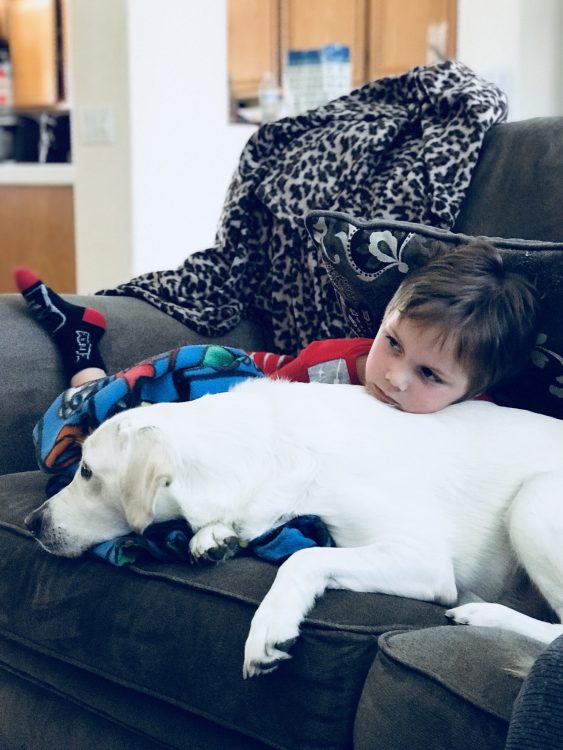When You Face the Possibility of Losing Your Child Every Night Because of SUDEP
When I adjusted to becoming a new mom to my firstborn son Shayne, the hardest thing for me to get accustomed to was the lack of sleep. Having a tiny newborn demanding your attention every few hours was not easy by any means. I felt detached from the world, like a zombie barely surviving on copious amounts of caffeine and the advice from my family and friends who would tell me, “This too shall pass.”
Eventually, it did seem to pass. When he was a few months old we were able to move him to his own room, and he began to sleep for longer stretches. This new routine refreshed me, and made me feel like a real person again. Even just adding a few more hours of sleep each night made me feel like everything was going to be OK. The well-meaning advice I had received was true — the stage of being sleep-deprived was indeed only temporary. If I only knew at that point what would lie ahead.
At exactly 7 months old, everything changed when Shayne had his first seizure. My husband was holding him on the couch when all of a sudden he began to turn blue and started convulsing. We called 911 and spent the night in the ER, only to be told it was most likely an isolated incident. Three days later he had another one, and we knew our journey was just beginning. At 8 months old he was diagnosed with epilepsy. It was through our own research that we learned about something called sudden unexpected death in epilepsy (SUDEP). We were shocked the doctors had not warned us about this, and we quickly learned that Shayne was at an increased risk of SUDEP due to his age of onset and the fact that his seizures were uncontrolled. We read tragic stories of people saying goodnight to their loved ones, only to discover the next morning that they passed away unexpectedly during the night. This knowledge triggered a new kind of sleep deprivation in us — one in which we could hardly rest because we were so worried our little boy was going to be taken from us during the night.
Flash forward to when Shayne was a little over a year old, and we received the results of his genetic testing. They found a mutation in his SCN1A gene, and his diagnosis would eventually change from idiopathic epilepsy to Dravet syndrome — a lifelong disorder for which there is no cure. Individuals with Dravet struggle with debilitating seizures that are extremely difficult to control with the currently available treatment options. This severe form of epilepsy has profound cognitive effects, and the majority require a lifetime of complete care. In addition to this, people with Dravet syndrome are at an increased risk of SUDEP, and there is a one in five chance they will not make it to adulthood. Now we were unable to sleep because we felt as if our son had just been given a potential death sentence. The overwhelming grief and worry we felt for his suddenly uncertain future was unbearable, and this lead to countless sleepless nights.
Fast forward a little more, to when Shayne turned 3 and everything changed once again. At this point he was still sleeping in his room independently, with multiple alarms set up to alert us if he were to have a seizure at night. The alarms started going off multiple times a week, and then every night, and eventually multiple times throughout each night. We would be jolted awake from our sleep by the frantic beeping of these alarms, only to look at the video monitor and see he was seizing. We would run into his room to help him, and stay with him until he recovered. He developed a fear of falling asleep alone because he sensed the danger that would befall him each night. One of us would lay with him until he was sound asleep, then we would sneak out of his room, only to return multiples times throughout the night to care for him after his seizures. Eventually, we knew this routine was not sustainable, and it seemed the nocturnal seizures were here to stay. For the first time since he was a baby, we moved him back into our room with a bed right next to ours, so we could be able to respond to his multiple nightly seizures immediately.
This is where we currently remain, three years later. Every night we are jolted awake to the sound of him seizing, and most nights this happens several times throughout the night. I have found him seizing face-down into his mattress. I have had to jump out of bed in the middle of the night to administer oxygen and rescue medication for longer nocturnal seizures. I have had to roll him onto his side when he vomited after a seizure, so he didn’t aspirate. I have awoken suddenly for no particular reason, only to roll over to check him and find him cold and non-responsive. In those moments his entire life flashes before my eyes, and I fear this is the moment we have been dreading for so long. By some miracle, the few times that has happened, Shayne has come back to us. He was just caught in a rare state of extremely deep sleep. However, the fear that is realized in those moments haunts me, and it’s something that makes me sick to my stomach and can bring me to my knees when the memory hits me.
When I think back to those early days as a new mom, in my sleep-deprived zombie state, I remember staring at my perfect baby boy and telling myself that I loved him so much that I would never be able to handle it if something happened to him. When I look at the woman I am now, with the dark circles and the wrinkles and gray hairs, after years of facing my worst fears on a nightly basis, I wish I could turn back the clock. I wish I could tell that young mom to enjoy those quiet moments in the middle of the night with her newborn baby. I wish I could hug her and tell her that life was going to be so much more beautiful than she could ever imagine. I wish I could tell her that her love for her child would keep her going through all of the sleepless nights, and that she would eventually learn to appreciate the gift of today without worrying about tomorrow. I wish I could let her know that while sleep would still be hard to come by, the laughter and joy and love would be overflowing. I wish I could tell her that his quality of life would become her driving passion, and that she would push herself to find joy in each and every day.
Ultimately, the phase of sleeplessness did not pass for us, and it likely never will. However, being the resilient creatures we are, especially as the parents of a medically fragile and complex child, we have learned to adapt. We look at the perseverance he has each and every day, despite his many challenges, and that is where we draw our strength from. Our hope and drive to provide him the best life possible is what pushes us through. We fight for him and alongside him, and we will keep fighting until a cure is found.



